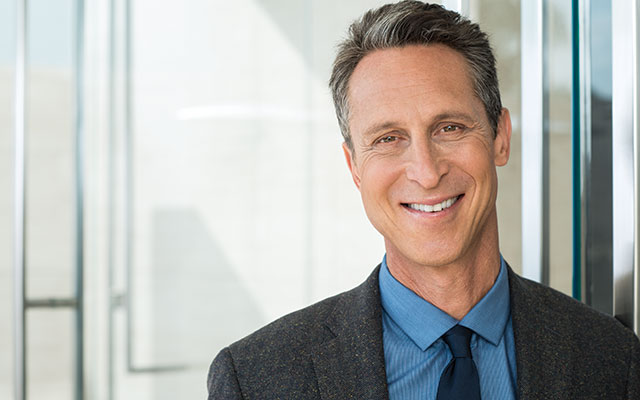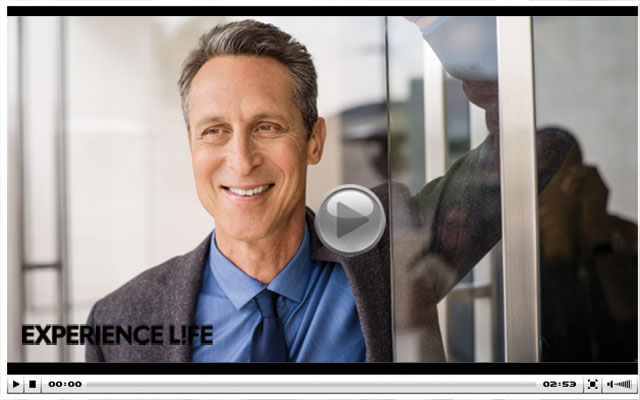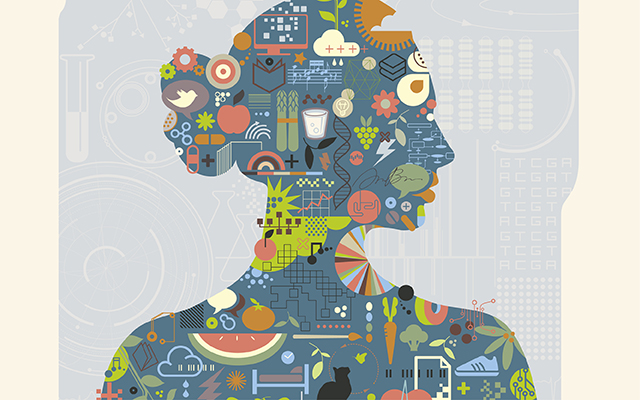If you’re a health seeker, you’ve likely heard of Dr. Mark Hyman. He’s a trusted source for many health news outlets and national TV shows, and was featured prominently in last year’s anti-processed-food documentary, Fed Up. He’s also authored eight New York Times bestsellers.
Hyman is a practicing family physician who has treated a wide range of patients, from the urban poor and Haitian earthquake victims to former President Bill Clinton. He served for several years as medical director for Canyon Ranch in Lenox, Mass., and then founded his own clinic, The UltraWellness Center, in the same town. Today he’s director of Cleveland Clinic’s new Center for Functional Medicine.
But among all his medical and media accomplishments, Hyman is proudest of his books — including UltraMetabolism, The UltraMind Solution, The Blood Sugar Solution, and his forthcoming title, The Blood Sugar Solution 10-Day Detox Cookbook (due out in early 2015) — because he’s seen them have the farthest-reaching impacts on people’s lives.
Hyman writes books, he says, because he wants to help more people than he can see in his private practice, and because he knows that millions need a better brand of health guidance and support than they are currently getting.
“In my books, I basically take people through the same process I take my patients through,” Hyman explains. “We go over a series of questions together, and based on their answers, we personalize the approach. Many people find that informed self-care — or what I call ‘self-health’ — is actually more effective than disease-based healthcare for many lifestyle-driven chronic conditions.”
Many people find that informed self-care — or what I call ‘self-health’ — is actually more effective than disease-based healthcare for many lifestyle-driven chronic conditions.”
Of course, there are many who do need professional care, but Hyman is concerned that too much of the medical treatment they receive is focused on managing or suppressing symptoms, rather than addressing the root causes of their maladies. With this in mind, he recently helped spearhead the first-of-its-kind functional-medicine program at the prestigious Cleveland Clinic.
The program will be conducting clinical trials comparing conventional and functional-medicine approaches in treating asthma, inflammatory bowel disease, type 2 diabetes, and migraines.
Hyman says he believes the program signals “a transformational shift in healthcare.” It has also sparked interest from other health organizations eager to bring functional medicine into what they’re doing. When it comes to medicine, says Hyman, “we’re looking at a whole new future.”
Experience Life | How did you get started practicing functional medicine?
Mark Hyman | I’ve always been interested in nutrition and health. I was a yoga teacher before I was a doctor. I studied nutrition at Cornell, and then decided on conventional medicine [at Ottawa University School of Medicine and University of California, San Francisco].
In my 30s, I got sick and developed chronic fatigue syndrome. I went from riding my bike 100 miles a day to not being able to walk up the stairs, from being able to remember 30 patients a day without any notes to not being able to remember where I was at the end of a sentence. I realized that conventional care had very little to offer me. I knew it was critical for me to find the real answers to why we get sick, and how we get better, which is not what I learned in conventional medicine.
Essentially, I started practicing what I was learning on myself, and then on patients. I got extraordinary results and very quickly realized that this model was the future of healthcare.
EL | How is functional medicine different from conventional medicine and also from “integrative” and “alternative” medicine?
MH | Functional medicine is a fundamental paradigm shift in the way we see disease. It views health conditions not based on symptoms, but on root causes. It’s a view that understands the body as a complex ecosystem influenced by environment, lifestyle, diet, mindset, and more. It explores how those factors influence our genes to create the expression of who we are at any moment.
Health is a state of balance. When your biological systems are out of balance, disease occurs. So rather than focusing on diseases, we focus on identifying imbalances — from the immune and digestive system to the microbiome, hormones, and detoxification — and as we treat those underlying issues, the things we call “diseases” get better as a side effect of creating health.
Health is a state of balance. When your biological systems are out of balance, disease occurs.
Alternative medicine consists of wonderful modalities like homeopathy, acupuncture, and Ayurveda. Some are also founded in systems thinking, but they’re outside of conventional Western biomedical science. Although they’re being studied, they’re things most regular Western doctors wouldn’t do — or learn in the course of their medical education.
Integrative medicine was an important advance that said, “There are all these traditions and therapies out there that seem to have value and help people feel better, so why don’t we integrate them with conventional care?”
The problem with simply taking the best of alternative and conventional medicine is that the paradigm of conventional medicine is fundamentally flawed. So you’re integrating a good system with the broken paradigm of disease-based medicine.
Integrative medicine represents a set of useful tools. Functional medicine is more like a map. The map is really the key to figuring out what’s wrong with somebody. From there, you can use whatever tools necessary, whether diet, medication, acupuncture, or whatever is appropriate for a particular condition. Functional medicine leverages the best of biomedical science, alternative medicine, and integrative medicine, but in a whole new systems-based model of healing.
EL | Tell us about the new functional-medicine program at Cleveland Clinic.
MH | This is the first world-class healthcare system that is placing its bet on functional medicine to provide a solution to chronic disease. It is a game changer. They are funding research for multiple chronic healthcare conditions with the goal of creating better outcomes at lower costs. They also recognize that health really happens outside hospital walls, and that behavior change requires shifts in the environment in which we live, so we are building community-based wellness programs.
It is well recognized that current medical education does not effectively train future doctors in nutrition or in lifestyle-related chronic disease, which represents the vast majority of our $3.8 trillion healthcare bill. So Cleveland Clinic is reforming medical education to integrate a functional-medicine and nutrition-based curriculum. This marks a tipping point in healthcare.
EL | What are the most effective things average people can do to reclaim their power over their own health?
MH | First, we need to stop outsourcing our cooking to corporations and learn to cook simple foods for ourselves.
Second, we need to learn to eat real, whole, fresh foods, and to see food as medicine. We’ve traditionally thought of food as a source of energy and calories, but through scientific advances, we’re learning that it does so much more. It communicates messages to your body — shifting your hormones, regulating proteins, altering the immune system, microbiome, and even gene expression. This means you have an opportunity to turn on or off mechanisms related to health and disease with every meal — in fact, with every single bite.
The third big thing is to build a network of support in your life. Community is the secret ingredient for creating health. If you’re trying to make healthy changes, friend power beats willpower any day.




This Post Has 0 Comments